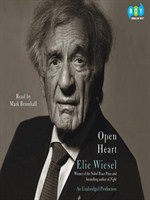From the book
1
June 16, 2011.
"It's your heart," says the gastroenterologist after performing an endoscopy on me.
I am surprised: "Not my stomach?"
For some time now, acid reflux has been one of my nightmares. My longtime general practitioner also feels it has contributed to the various health problems that have afflicted me for the past several years.
My wife, Marion, and I have just returned from Jerusalem, where, every year, we spend the holiday of Shavuot with close friends. In keeping with the tradition to which I have remained faithful, friends and I spent the night in a yeshiva in the Old City studying biblical and Talmudic laws and commentaries dating from the Middle Ages.
This time, in Jerusalem, it had all gone well. No terrorist attacks. No border incidents. Even my cursed migraines seemed to respect the sanctity of this night, of this city unlike any other. But now, back in New York, suddenly my body revolts. The new piercing pain in my shoulders rises all the way to my jaw. I swallow a double dose of Nexium, the medicine I take for acid reflux. This time without success.
"No, neither the stomach nor the esophagus," replies the doctor after a moment of silence. "It's certainly the heart." Ominous words, inducing fear and the promise of more pain. Or worse.
2
as soon as he receives his colleague's message, my primary care doctor, a cardiologist, reaches me at home. On the phone, he appears to be out of breath; he speaks in a tense, emphatic voice, louder than usual. I have the feeling that he is trying to contain or even hide his nervousness, his concern. Clearly, he is unhappy to have to give me this bad news that will change so many things for me . . .
"I expected a different result," he explains. "But now the situation requires some further tests immediately."
"Yes?"
"Please come to Lenox Hill Hospital right away. I am already there."
I protest: "Why? Because it's the heart? Is it really that urgent? I have never had a problem with my heart. With my head, yes; my stomach too. And sometimes with my eyes. But the heart has left me in peace."
At that, he explodes: "This conversation makes no sense. I am your cardiologist, for heaven's sake! Please don't argue with me! You must take a number of tests that can only be administered at the hospital. Come as quickly as you can! And take the emergency entrance!"
On occasion, I can be incredibly stupid and stubborn. And so I nevertheless steal two hours to go to my office. I have things to attend to. Appointments to cancel. Letters to sign. People to see--among others, a delegation of Iranian dissidents.
Strange, all this time I am not really worried, though by nature I am rather anxious and pessimistic. My heart does not beat faster. My breathing is normal. No pain. No premonitions. No warning. After all, hadn't I just three days ago gone through a complete checkup with all kinds of tests, including a cardiogram, administered by my physician, the same one who is now ordering me to the hospital? There had been no indication of a coronary problem: no chest pain or feeling of oppression. What has changed so abruptly in my body to destabilize it to this extent?
All right, I'll go to the hospital, since both doctors insist. I don't take anything along. No books, no spare shirt, no toothbrush. Marion says she wants to accompany me. I try to discourage her. In vain.
3
a team of specialists is waiting for me in the emergency room. The very first blood test instantly reveals the gravity of my condition. There is a definite risk of heart attack. The doctors exchange incomprehensible comments...



